情态动词和倒装
情态动词讲解以及倒装句练习40题(附答案)

may和might的用法 和 的用法
1. 表示许可。 表示请求、允许时,might比may的语气更委婉一些,否定回答时(口语中常 用) no , you can't . or , yes, please 用mustn't表示“不可以”、“禁止”、“阻 止”之意(具有强烈禁止的意思)如: You may drive the car. — Might I use your pen? — No, you mustn't. 用May I ... 征询对方许可在文体上比较正式,在口气上比较客气。在日常 口语中,用Can I ... 征询对方意见在现代口语中更为常见。
must和have to的用法 和 的用法
1. 表示必须、必要。(must表示主观多一些而have to则表示客观多一 些)如: You must come in time. 回答must引出的问句时,如果是否定的回答,不能用mustn't,而 要用needn't或don't have to。 — Must we hand in our exercise books today? — Yes, you must. (No, you don’t have to.)
Could 和 can 的用法
. 表示能力或客观可能性,还可以表示请求和允许。如: Can you finish this work tonight? Man can not live without air. — Can I go now? — Yes, you can. 注意:①could也可表示请求,语气委婉,主要用于疑问句,不可用于肯定句, 答语应用can(即could不能用于现在时态的简略答语中)。如: Could I come to see you tomorrow? Yes, you can. (否定答语可用No, I'm afraid not.) ②can表示能力时,还可用be able to代替。如: I'll not be able to come this afternoon.
英语倒装句分两种
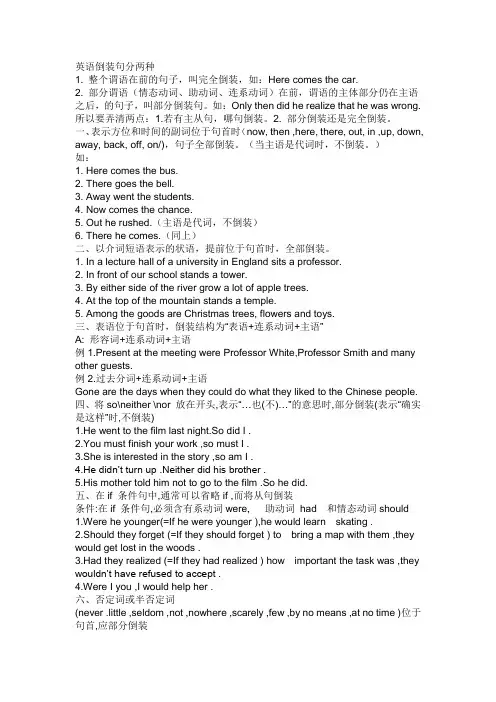
英语倒装句分两种1. 整个谓语在前的句子,叫完全倒装,如:Here comes the car.2. 部分谓语(情态动词、助动词、连系动词)在前,谓语的主体部分仍在主语之后,的句子,叫部分倒装句。
如:Only then did he realize that he was wrong. 所以要弄清两点:1.若有主从句,哪句倒装。
2. 部分倒装还是完全倒装。
一、表示方位和时间的副词位于句首时(now, then ,here, there, out, in ,up, down, away, back, off, on/),句子全部倒装。
(当主语是代词时,不倒装。
)如:1. Here comes the bus.2. There goes the bell.3. Away went the students.4. Now comes the chance.5. Out he rushed.(主语是代词,不倒装)6. There he comes.(同上)二、以介词短语表示的状语,提前位于句首时,全部倒装。
1. In a lecture hall of a university in England sits a professor.2. In front of our school stands a tower.3. By either side of the river grow a lot of apple trees.4. At the top of the mountain stands a temple.5. Among the goods are Christmas trees, flowers and toys.三、表语位于句首时,倒装结构为“表语+连系动词+主语”A: 形容词+连系动词+主语例1.Present at the meeting were Professor White,Professor Smith and many other guests.例2.过去分词+连系动词+主语Gone are the days when they could do what they liked to the Chinese people.四、将so\neither \nor 放在开头,表示“…也(不)…”的意思时,部分倒装(表示“确实是这样”时,不倒装)1.He went to the film last night.So did I .2.You must finish your work ,so must I .3.She is interested in the story ,so am I .4.He didn’t turn up .Neither did his brother .5.His mother told him not to go to the film .So he did.五、在if 条件句中,通常可以省略if ,而将从句倒装条件:在if 条件句,必须含有系动词were, 助动词had 和情态动词should1.Were he younger(=If he were younger ),he would learn skating .2.Should they forget (=If they should forget ) to bring a map with them ,they would get lost in the woods .3.Had they realized (=If they had realized ) how important the task was ,they wouldn’t have refused to accept .4.Were I you ,I would help her .六、否定词或半否定词(never .little ,seldom ,not ,nowhere ,scarely ,few ,by no means ,at no time )位于句首,应部分倒装1.Never have I been there .2.Little did I know about it .3.Seldom did she come late to school .4.Not a single mistake did he make .5.By no means should you buy that kind of car .七、以not until ,no sooner …than , hardly …when ,not only …but also 所引导的状语放在句首时,需要部分倒装1.Not until 10’clock will the library open .2.No sooner had I gone out than he came to see me .3.Hardly had the train arrived when I ran to meet my friend.4.Not only does she speak English but also she follows the British way of life .八、only 及其修饰的状语位于句首时,后面的句子部分倒装。
英语中常见的倒装形式
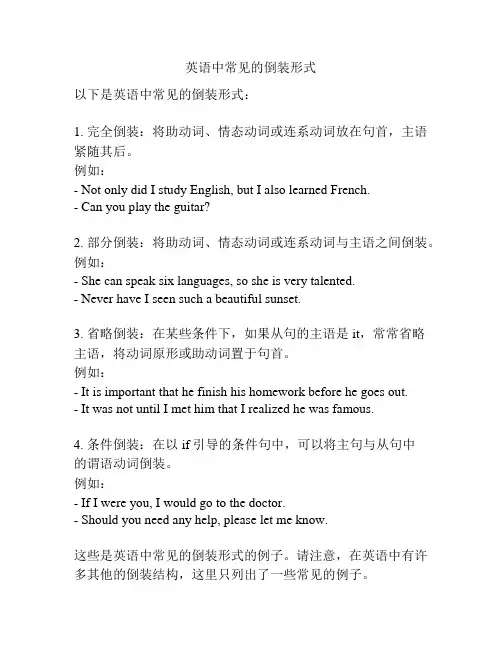
英语中常见的倒装形式
以下是英语中常见的倒装形式:
1. 完全倒装:将助动词、情态动词或连系动词放在句首,主语紧随其后。
例如:
- Not only did I study English, but I also learned French.
- Can you play the guitar?
2. 部分倒装:将助动词、情态动词或连系动词与主语之间倒装。
例如:
- She can speak six languages, so she is very talented.
- Never have I seen such a beautiful sunset.
3. 省略倒装:在某些条件下,如果从句的主语是it,常常省略
主语,将动词原形或助动词置于句首。
例如:
- It is important that he finish his homework before he goes out.
- It was not until I met him that I realized he was famous.
4. 条件倒装:在以if引导的条件句中,可以将主句与从句中
的谓语动词倒装。
例如:
- If I were you, I would go to the doctor.
- Should you need any help, please let me know.
这些是英语中常见的倒装形式的例子。
请注意,在英语中有许多其他的倒装结构,这里只列出了一些常见的例子。
高考英语常用句型以及例句-8-10虚拟语气 情态动词 倒装 否定句
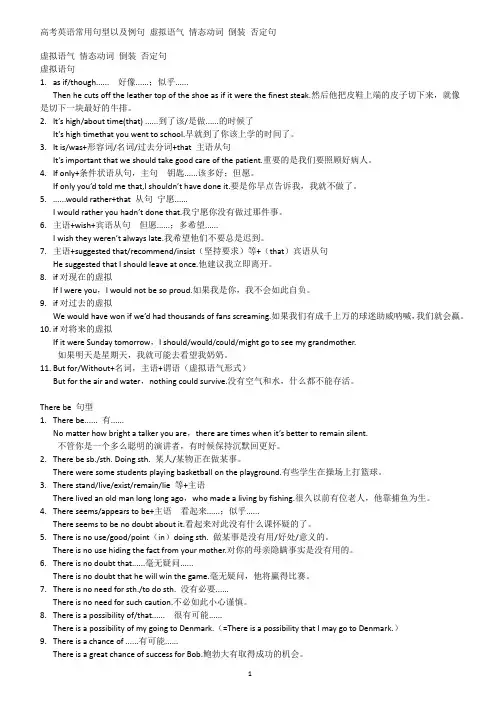
虚拟语气情态动词倒装否定句虚拟语句1.as if/though...... 好像......;似乎......Then he cuts off the leather top of the shoe as if it were the finest steak.然后他把皮鞋上端的皮子切下来,就像是切下一块最好的牛排。
2.It’s high/about time(that) ......到了该/是做......的时候了It’s high timethat you went to school.早就到了你该上学的时间了。
3.It is/was+形容词/名词/过去分词+that 主语从句It’s important that we should take good care of the patient.重要的是我们要照顾好病人。
4.If only+条件状语从句,主句钥匙......该多好;但愿。
If only you’d told me that,I shouldn’t have done it.要是你早点告诉我,我就不做了。
5.......would rather+that 从句宁愿......I would rather you hadn’t done that.我宁愿你没有做过那件事。
6.主语+wish+宾语从句但愿......;多希望......I wish they weren’t always late.我希望他们不要总是迟到。
7.主语+suggested that/recommend/insist(坚持要求)等+(that)宾语从句He suggested that I should leave at once.他建议我立即离开。
8.if对现在的虚拟If I were you,I would not be so proud.如果我是你,我不会如此自负。
9.if对过去的虚拟We would have won if we’d had thousands of fans screaming.如果我们有成千上万的球迷助威呐喊,我们就会赢。
初三语法讲解情态动词倒装和虚拟语气的用法详解
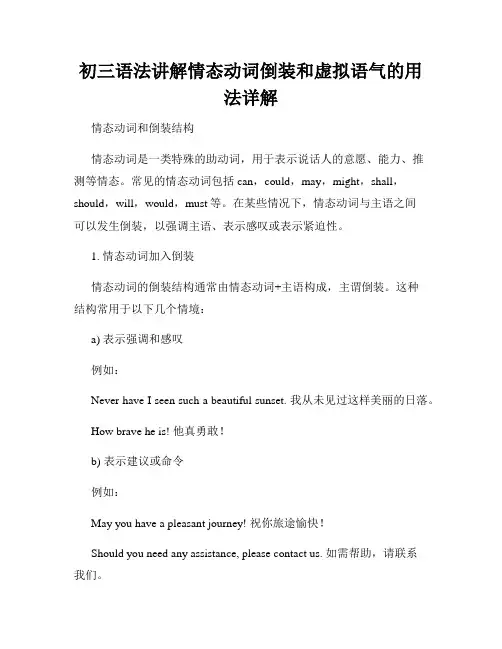
初三语法讲解情态动词倒装和虚拟语气的用法详解情态动词和倒装结构情态动词是一类特殊的助动词,用于表示说话人的意愿、能力、推测等情态。
常见的情态动词包括can,could,may,might,shall,should,will,would,must等。
在某些情况下,情态动词与主语之间可以发生倒装,以强调主语、表示感叹或表示紧迫性。
1. 情态动词加入倒装情态动词的倒装结构通常由情态动词+主语构成,主谓倒装。
这种结构常用于以下几个情境:a) 表示强调和感叹例如:Never have I seen such a beautiful sunset. 我从未见过这样美丽的日落。
How brave he is! 他真勇敢!b) 表示建议或命令例如:May you have a pleasant journey! 祝你旅途愉快!Should you need any assistance, please contact us. 如需帮助,请联系我们。
c) 表示条件例如:Were he here, he would help us. 如果他在这里,他会帮助我们的。
2. 情态动词与not一起的倒装当情态动词与not连用时,可以将not置于句首,构成动词的倒装结构。
这种结构常用于祈使句或表示强调的句子中。
常见的结构有:a) Shall not例如:Shall you not tell her the truth? 你难道不应该告诉她实情吗?b) Will not例如:Will you not accompany me to the party? 你难道不会陪我去参加聚会吗?c) Can not例如:Can you not see the sign? 你难道没有看到标志吗?虚拟语气的用法虚拟语气是表示与事实相反、假设或愿望等非真实情况的一种语气。
在英语中,虚拟语气主要通过动词的形态和从句结构来表达。
1. 虚拟语气的形态a) 过去时当表示与现在或将来相反的非真实情况时,常用虚拟语气的过去时态。
倒装结构.与情态动词docx
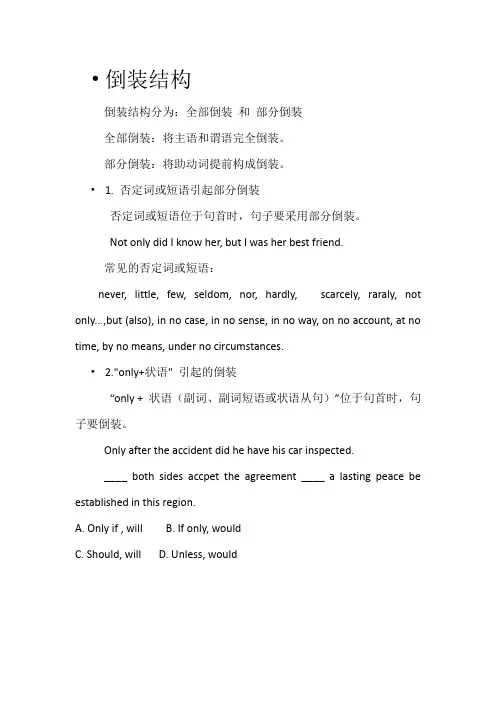
•倒装结构倒装结构分为:全部倒装和部分倒装全部倒装:将主语和谓语完全倒装。
部分倒装:将助动词提前构成倒装。
• 1. 否定词或短语引起部分倒装否定词或短语位于句首时,句子要采用部分倒装。
Not only did I know her, but I was her best friend.常见的否定词或短语:never, little, few, seldom, nor, hardly, scarcely, raraly, not only...,but (also), in no case, in no sense, in no way, on no account, at no time, by no means, under no circumstances.• 2."only+状语" 引起的倒装“only + 状语(副词、副词短语或状语从句)”位于句首时,句子要倒装。
Only after the accident did he have his car inspected.____ both sides accpet the agreement ____ a lasting peace be established in this region.A. Only if , willB. If only, wouldC. Should, willD. Unless, would情态动词may, mightcan, couldmust, needshould, ought to•一、情态动词表推测1. 肯定推测must do 对现在或将来的事肯定猜测must have done 对过去的事肯定猜测2. 否定推测can't do 对现在或将来的事否定猜测can't have done 对过去的事否定猜测3. 不确定推测may/might do 对现在或将来的事不确定地推测may/might have done 对过去的事不确定地推测e.g.Nancy's gone to work but her car's still there. She ____ by bus.A. must have goneB. should have goneC. ought to have goneD. could have gone•二、情态动词+have done表虚拟1. should/shouldn't have doneshould 本应该做某事而实际上没有做shouldn't 本不应该做但实际却做了如:You should have finished your homework. 2. needn't have done表示本来没有必要做而实际上已经做了。
英语倒装句归纳
英语倒装句归纳 Share classic historical materials英语倒装句的用法类型1)部分倒装——助动词\情态动词+主语+谓语的实义动词型2)全倒装——谓语+主语型一、在以下结构中用全倒装:这种结构通常只用于一般现在时和一般过去时..常见的结构有:1.在there be或者There livestand;appear.seem;remain;exist…. 句型中;如:There are thousands of people on the square. 原语序:Thousands of people are there on the square.There lived an old fisherman in the village. 原语序:An old fisherman lived there in the village.There stands a little girl. 正常语序:A little girl stands there.2.在“here; there; now; thus; then+动词+主语”的句子中;谓语动词为be; go;come; lie; run等;主语为名词;Now comes my turn. There goes the bell. Then came the order to leave. Here comes a bus= A bus comes here.3.在“out\ in; up\ down; off\away;in the distance;on the hill;round the corner”等表示方向性的副词或表示地点的介词词组位于句首;且主语又是名词;谓语是表示运动的动词..Away went the crowed one by one. In came a stranger in black.Out rushed the children.. Down fell the leaves. On the floor were pilesof old books.☆注意:主语必须是名词eg: Out she went.There they are. Here he comes. 而Out went the girl. Here comes the boy.4.有时为了强调表语;构成“表语+连系动词+主语”结构;Lucky is she who was chosen to be a leader.=She who was chosen to be a leader is lucky.Gone are the days when women were looked down upon =The days when women were looked down upon are gone5、在某些表示愿望的祝愿语中;全倒装..Long live the People's Republic of China May you be happy二、在以下结构中用部分倒装部分倒装是指将谓语的一部分如助动词或情态倒装至主语之前..如果句中的谓语没有助动词或情态动词;则需添加助动词do; does或did;并将其置于主语之前..1.含有否定或半否定意义的词语如:not;never;seldom;hardly;little;scarcely;barely;few…;或者含有否定结构的连词not only…but also..; neither..nor..; no sooner had…than...一......就......; scarely..than..; Hardly had ...when..; not until...;nowhere等;或否定意义的介词词组by no means决不;in no case\way任何情况下都不;with no method; at no time决不; on no account决不;under no circumstances\condition...任何情况下都不位于句首eg: I have never seen him before.=Never have I seen him before.Not a word did he say when he left. Seldom/Scarecely does he go to that park.Hardly几乎不...... do I speak to him. Little English can he speak.Little does he realize the importance of the meeting. Few people did I see in the street.含有否定结构的连词:eg:1Not only can he play basketball; but also I can.2No sooner had we arrived home than it began to rain.3Hardly had we met our friends when the train left.4Not until the baby fell asleep did the mother leave the room.主句倒装;从句不倒装=The mother didn’t leave the room until the baby fell asleep.注意:1Not only...but also...必须连接两个分句时;才使用部分倒装..而且只倒装not only后的分句..如果连接的是两个并列词语;不用倒装结构..如:Not only his father but also I like reading.2Hardly...when...; Scarcely...than...; No sooner...than...意义基本相同;它们连接的句子;都只倒装前一个分句;即:“前倒后不倒装”..3当not until直到......才引导主从复合句时;主句倒装;从句不用倒装;或者可以理解为:“后倒前不倒装”..含有否定意义的介词词组:如:By no means should we tell lies. On no account should we let him leave.At no time决不will I get married to you. In Under no circumstances will I lend money to him.注意:in no time立即;马上位于句首时;其后无需用倒装语序:In no time he worked out the problem. 他马上就算出了那道题..2.only+副词;或介词短语;或状语从句时;主句倒装;eg: Only in this way can you use the computer well. only+介词短语Only yesterday did he find out that his watch was missing.only+副词Only when it began to rain did he finish his job.only+状语从句3.so用在句首;表示另一主语“也......样”时;用“So + behave;助动词或情态动词+主语”结构;而表示另一主语“也不......样”时;用“Nor\Neither + behave;助动词或情态动词+主语”结构;注意:若是对上文同一主语的情况进行强调时;不倒装..句型为“So+主语+be或dodid/have ”..He went to school yesterday; so did I.---David has made great progress recently. --So he has; and so have you.He hasn't finished his homework; and nor have I. 特别注意:If you won't go; neither/nor will I.4.as 作“尽管/虽然”;引导让步状语从句as可以换成though;由于语法需要;需要部分倒装..Shortest as/though she is; she is not the fattest.倒装后;最高级前不用冠词Child as he is; he knows a lot.倒装后;单数名词前不用aFail as I did; I would try again.倒装后;实义动词提前;在主语后添加助动词.. Hard as he tried; he didn't pass the exam.副词提到句首注意:though位于句首引导让步状语从句时;可以倒装;也可以不倒装..但as引导让步状语从句时;必须使用倒装..否则就变成了原因状语从句..eg:As he is too young; he couldn't go to school.5.在”so…that…”和”such…that…”引导的结果状语从句中;当so和such位于句首时;用”so\such + ... +部分谓语+ 主语+...”;So difficult was the exam that most of the students failed to pass it.=The exam was so difficult that most of the students failed to pass it.6.若if 引导的虚拟条件句中有were; had; should 时; 可将if省略;把were; had ; should 放在句首..1)Should it rain tomorrow; we would not play basketball.=If it should rain tomorrow; we would not play basketball.2Had I prepared well; I couldn't have lost the job.=If I had prepared well; I couldn't have lost the job.3 Were he to come tomorrow; I would go to meet him at the airport.=If he were to come tomorrow; I would go to meet him at the airport.倒装句练习题1. Not until I began to work ____ how much time I had wasted.A. didn't I realizeB. did I realizeC. I didn't realizeD. I realized2. Only by practising a few hours every day ____ be able to master the language.A. you canB. can youC. you willD. will you3. If you don't go; neither ____.A. shall I B. do I C. I do D. I shall4. No sooner ____ to the station ____ the train left.A. had I got; whenB. I had got; thanC. had I got; thanD. didI get; when5. — Your father is very strict with you. —_____ He never lets off a single mistake of ours.A. So he isB. So is heC. He is soD. So does he6. ____ today; he would get there by Sunday.A. Would he leaveB. Was he leavingC. Were he to leaveD. If he leave7. Never in my life ____ such a thing.A. I have heard or have seenB. have I heard or seenC. I have heard or seenD. did I hear or see8. —— Here ____ Where is Xiao LiuThere ____.A. comes the bus; is heB. comes the bus; he isC. the bus comes; is heD. the bus comes; he is9. ____ ;I will not buy it.A. Much as do I like itB. As much I like itC. Much as I like itD. As I like it much10. —— I like football. I don't like volleyball. ____.A. So do IB. Neither do IC. So it is with meD. So is it with me11. _____ the expense; I _____ to Italy.A. If it were not; goB. Were it not for\would goC. Weren't it for\will goD. If it hadn't been\would have gone12. So _____ in the darkness that he didn't dare to move an inch.A. he was frightenedB. was he frightenedC. frightened he wasD. frightened was he13. -- In modem times; girls like beautiful clothes.--Yes; _____ and_____ After all; our life has greatly improved.A. so do they; so do youB. so they do; so you doC. so do they; so you doD. so they do; so do you14. —— You have an English class every day except Sunday. _____.A. So we haveB. So we doC. So have weD. So do we15. I wonder if your wife will go to the ball. If your wife _____; so_____ mine.A. does; willB. will; doesC. will; wouldD. does; do16. Only after I read the text over again _____ its main idea.A. that I knewB. did I knewC. 1 could knowD. I did know17--You seem to have learned all the English words by heart. -- _____ .A. So l doB. So do lC. So I haveD. So have I18. -- I seldom watch TV; but listen to the radio a lot. --_____ .A. So do IB. Neither do IC. I m the sameD. So it is with me19. So excited _____ that he couldn't say a word.A. he seemedB. did he seemC. was he seemingD. he did look20. Jimmy was so nervous not a single word _____ down in the dictation.A. he wroteB. he was writtenC. did he writeD. was he written21. Little ______ when 1 took the trip where it would lead me.A. have I knownB. had I knownC. do 1 knowD. did I know22. -- Have you ever seen anything like that before---- ____.A. No; I never have seen anything like that beforeB. No; never I have seen anything like that beforeC. No; never have 1 seen anything like that beforeD. No; I have seen anything like that before never23. _____ ;1 would accept the invitation and go to the party.A. Were I youB. Was I youC. Had I been youD. Would 1 be you24. You should work less _____.A. and neither should IB. and so should IC. and nor should ID. and so I should25. _____ and caught the mouse.A. Up the cat jumpedB. The cat up jumpedC. Up jumped the catD. Jumped up the cat26. Not only _____ a promise; but also he kept it.A. did he makeB. he madeC. does he makeD. has he made27. His uncle is a worker and has been working in the factory for more than ten years. _____.A. So is his auntB. So has his auntC. So his aunt doesD. Soit is with his aunt28. Not once _____ their plan.A. did they changeB. they changedC. changed theyD. they did change29. -- Do you know Jim quarreled with his brother-- I don't know; and______ .A. nor don't I careB. nor do I careC. I don't care neitherD. Idon't care also30. Not until he arrived home _____ he find that this wallet had been stolen.A. didB. wouldC. whenD. that31. --This is one of the oldest trees in the world. _____ such a big tree.A. Never I have seenB. I haven't never seenC. Never have I seenD. I have seen never32. Nowhere else in the world _____ cheaper tailoring裁缝业;成衣业thanin Hong Kong.A. a tourist can findB. can a tourist findC. a tourist will findD.a tourist has found33._____ succeed in doing anything.A. Only by working hard we canB. By only working hard we canC. Only we can by working hardD. Only by working hard can we34._____ that we all went out; lying in the sun.A. So fine was the weatherB. So was the fine weatherC. The weather was so fine wasD. So the weather was tine35. ____ a nice man ____ that we all believe him.A. So; did he seemB. So; he seemedC. Such; he seemedD. Such; did he seem36. --You seem to be an actor. --___ . I have played many parts in alot of films.A. So do IB. So am IC. So I doD. So I am37. Not only ____ working hard; but also ____ very polite.A. the boy is; he isB. is the boy; he isC. the boy is; is heD. is the boy; is he38. ____; he never seems able to do the work beautifully.A. Try as he doesB. As he triesC. Try as does heD. As try he does39.-- I cannot see the picture well from here.---- _____.A. Neither can t IB. Neither I canC. I can't neitherD.Neither can I40.--You ought to have given them some advice ---- _____; but who cared what I askedA. So ought youB. So 1 oughtC. So it wasD. So I did41. So carelessly _____ that he almost killed himself.A. he drivesB. does he driveC. did he driveD. he drove42. Little _____ about his own health though he was very ill.A. he caredB. did he careC. he caresD. does he care43. Well ____ know him and well ____ know me.A. I did; he didB. did I; he didC. did I; did heD. I did; did he44. No sooner ____ they rushed out into the street.A. did they hear the news thanB. did they hear the news whenC. had they heard the news thanD. had they heard the news when45. Little wonder _____ up their hands in dismay.A. have some thrownB. some have thrownC. thrown some haveD. have thrown some46. ____; he would have passed the exam. A. If he were to studyB. If he studied hardC. Had he studied hardD. Should he study hard47. We were lucky enough; for no sooner _____ home _____ it rained.A. we returned; andB. we had returned; whenC. did we return; whenD. had we returned; than48. So little _____ agree on the plan that they could not settle their difference.A. did theyB. do theyC. they didD. they did not49. _____ he realized it was too late to return home.A. No sooner it grew dark thanB. Hardly did it grow dark whenC. It was not until dark thatD. It was until dark that参考答案1~5 BDACA 6~10 CBBCC 11~15 BDDBA 16~20 BADBC 21~25 DCABC 26~30 ADABA 31~35 CBDAD 36~40 DBADD 41~45 CBCCB 46~49 CDAC。
倒装的用法
倒装倒装一倒装的概念二倒装的分类三倒装的用法(NAO SHI原则+补充)四倒装解题思路五倒装生活应用六典型例题一倒装的概念什么是倒装呢?首先了解一下正常句子的基本语序:主+谓+宾、主+系+表。
而倒装分两种情况:(1)谓语动词或助动词(be动词、情态动词)置于主语前;(2)将宾语、表语、宾语补足语提到主语之前。
倒装是一种语法手段,用于表示一定的句子结构或强调某一句子成分。
二倒装的分类1.完全倒装:谓语动词+主语例句:there is/lies a temple.那儿有一座庙。
2.部分倒装:助动词/be/情态动词+S+V+...例句:Seldom have they played video games ever since they entered college.自从他们上大学后,他们很少玩电脑游戏了。
注意:为了方便理解,大家可以参考一般疑问句句型。
3.特殊结构:as/though用于让步状语从句例句:So tough is the job that few people are qualified for it.这项工作要求太高,几乎无人能够胜任。
三倒装的用法(NAO SHI原则+补充)注意:在NAO SHI原则中,NOS三原则常考,HI原则需要掌握。
另外A原则实质时前置,主要结构为as/though+主谓。
N=否定状语及否定句型位于句首的倒装(部分倒装)【重点】1.否定副词或连词(部分倒装):never,rarely,seldom,little,few,not,nowhere,hardly,neither...nor...引导两个分句。
1)Never have I seen such a splendid building.我从来没有见过这么宏伟的建筑。
2)Never has Mary’s performance been so impressive.玛丽的表演从来没有这样令人印象深刻。
2.否定短语(部分倒装):by no means,in no case,in no way,at no time,in no sense,on no account, under no circumstances决不例句:1)By no means should we look down upon the people who get the lower positions than us.我们决不能看低那些职位比我们低的人。
情态动词的虚拟语气中,只有哪个可以倒装?
情态动词的虚拟语气中,只有哪个可以倒装?情态动词的虚拟语气中,只有哪个可以倒装?在有情态动词的虚拟语气条件句中,只有should可以倒装。
倒装时,把should移至句首,去掉if。
例如:If you should prepare to go there ,I should go with you.= Should you prepare to go there ,I should go with you. 如果你准备去那里的话,我就和你一块去。
若虚拟语气条件句中有动词were,should或had, 都可以把这三个词放在主语之前,去掉if,变成倒装句。
例如:If I were a bird,I would fly.=Were I a bird,I would fly.如果我是一只小鸟,我就会飞翔。
If we were confident ,we would be able to overe all difficulties.= Were we confident ,we would be able to overe all difficulties.如果我们有信心,就能够克服所有的困难。
If he should agree to go there, we would send him there.=Should he agree to go there, we would send him there. 要是他答应去的话,我们就派他去。
If you had e,we wouldn't have been so busy.= Had you e yesterday, we wouldn't have been so busy.如果你昨天来的话,我们就不会那么忙了。
If I had enough time, I would go to his help.= Had I enough time, I would go to his help.如果我有足够的时间,就去帮助他。
高中英语语法——倒装句
倒装句倒装的原因:①语法原因②强调③平衡句子结构④承上启下完全倒装:整个谓语都在主语之前。
部分倒装:助动词/be/情态动词等放在主语之前。
一、完全倒装:整个谓语都在主语之前1. there be句型(特殊的全部倒装句型):其中be可换为appear, come,exist, happen,lie,live,stand等动词。
[exist/iɡ'zɪst/ vi.存在;生存]There is an experienced teacher and many lovely students in the classroom. 教室里有一位经验丰富的老师和许多可爱的学生。
There stands a temple on the top ofthe mountain. 山顶上有座庙。
2. 将here, there, now, then等地点或时间副词置于句首,且谓语动词是be, come, go, remain, lie, run等,且主语为名词时,用完全倒装。
—Is everyone here? 每个人都在这儿吗?—Not yet ... Look, there come the rest of our guests! 还没有。
看,其余的客人来了。
Here comes my list of dos and don’ts:... 下面是我的行为准则:...Here is some advice for you to follow while listening to his lecture.下面是你听他的报告时可以遵循的一些建议。
3. 表示运动方向的副词out, in, up, down, away等置于句首,谓语是表示运动的动词,且主语为名词时,句子要用完全倒装。
In the dark corner of the room, up jumped the cat and caught the mouse. 在房间黑暗的角落里,那只猫跳了上去并抓住了那只老鼠。
- 1、下载文档前请自行甄别文档内容的完整性,平台不提供额外的编辑、内容补充、找答案等附加服务。
- 2、"仅部分预览"的文档,不可在线预览部分如存在完整性等问题,可反馈申请退款(可完整预览的文档不适用该条件!)。
- 3、如文档侵犯您的权益,请联系客服反馈,我们会尽快为您处理(人工客服工作时间:9:00-18:30)。
情态动词完成时的用法( have + done)
3. could+have done用于过去的事情,和can +have +V.ed 一样,但是更含蓄。
e.g. Where could she have gone?
情态动词完成时的用法( have + V.ed)
4. may + have +done 表示说话人对过去发生的事情有 所怀疑或轻度有把握的事情的推测。
e.g. --Where is Tom? ----He may have gone to the skating ring. I am not sure.
情态动词完成时的用法( have + V.ed)
5. might + have + done 表示对过去事情可能性的推测, 所推测的可能性与实际情况相反,往往含有批评之意。
e.g. You might have finished the work earlier.
情态动词完成时的用法( have + V.ed)
6. need+ have+done 表示现在对过去某事是否必要的看 法。常含有责备的意味。常用在否定句中。
e.g. You needn’t have kept me waiting all the time.
7. Since she is angry,we __C____ her alone.
A) Had better to leave
B) had rather to
C) might as well leave
D) should as well leave
8.the classroom is empty. I think they__D__to the library.
1. Mary's score on the test is the highest in her class;
she __C__ have studied very hard.
A) may B) should C) must D) ought to
2.You _D____ her in here office last Friday; she's been
B) used to be
C) formerly were
D) had been
情态动词完成时的用法( have + done)
6. You _D____ read that article if you don’t want to.
A) haven’t
B) can’t C) mustn’t
D) needn’t
e.g. You ought to /should been here five minutes ago.
e.g. You shouldn’t/ ought not to have allowed the child to go alone.
情态动词完成时的用法( have + done) 情态动词 + 动词完成进行时have been doing
A) Should be studying B) should studying
C) ought to be studied
D) ought to studying
5. She is studying medical science now but she__B____
a lawyer.
A) would be
You needn’t have come last night.
情态动词完成时的用法( have + done)
7. should +have +done, ought to+ have + done 表示过去 本应该做某事而没有做
sholud+ haven’t done 表示过去不应该做某事而做了
情态动词完成时的用法( have + V2.ed)
2. can/can’t have done 表示说话人对过去一件行为的 真实性所持的态度,态度可能是惊奇、怀疑或不相信。 e.g. Can she really have behaved so badly? (惊奇、怀疑)
Tony can’t have done that. He hasn’t the strength.
情态动词练习 倒装练习
情态动词完成时的用法( have + done)
1. must +have done:表示对过去事情的较有把握的肯定 推测,这时只能用在肯定句中,在否定句和疑问句里, 用can’t/couldn’t 或can/could
e.g. From what you said, she must have told you all about it.
out of town for two weeks.
A) needn't have seen
B) must have seen
C) might have seen
D) can't have seen
情态动词完成时的用法( have + done)
情态动词 + 动词完成进行时have been doing
A) should have gone
B) ought have gone
C) must go
D) must have gone
情态动词完成时的用法( have + done) 情态动词 + 动词完成进行时have been doing
9. Are you daydreaming, John? You _y_o_u_s_h_o_u_l_d_b_e
(should, listen) You _n_e_ed__n_’t__co_m__e__ (needn’t, come ) all the way to meet me. I know this place pretty well.
3. The room is in terrible mess; it ____A_____ cleaned.
A) can't have been B) shouldn't have been C) mustn't have been D) wouldn't have been
4. John is playing soccer, but he _A___.
